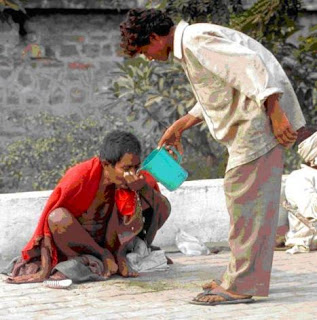[ Government help is
no longer needed, a few readers of The New York Times said. “If this is the
golden period for Dalits then why do they still need reservation in government
jobs and education?,” writes Sapan Kapoor from India
 |
| A Dalit drinks water from some upper caste people (sic). Image courtesy: Dalits in India |
Writing
about caste in India often generates a heated response, and “India’s Boom
Creates Openings for Untouchables,” a recent article in The New York Times about successful
Dalit, or “untouchable,” entrepreneurs, was no exception. Readers weighed in on
social mobility in India
“We Indians are the biggest racists,” wrote Paul George from India
“All the talk from Indians about Indian culture and religion amount to
nothing but rubbish,” wrote Kalidan from New York India
Others argued that the fact that Ashok Khade, the main businessman in
the article, was able to transform himself from poverty-stricken child to
millionaire businessman was inspiring proof that the system is improving.
 |
| The UP Chief Minister Mayawati. Reuters has dubbed her India's "Untouchables Queen" |
That system has been so successful that more people want in, the Wall
Street Journal reported
recently. The number of so-called “backward classes” in India
Government help is no longer needed, a few readers of The New York
Times said. “If this is the golden period for Dalits then why do they still
need reservation in government jobs and education?,” writes Sapan Kapoor from India
Is Mr. Khade’s rags-to-riches tale an inspirational example of what’s possible in modernIndia
Is Mr. Khade’s rags-to-riches tale an inspirational example of what’s possible in modern
REPORT CONDEMNS JAPAN’S RESPONSE TO NUCLEAR ACCIDENT
[According to the report, a final version of which is due by mid-2012, the authorities grossly underestimated the risks tsunamis posed to the plant. The charges echoed previous charges made by nuclear critics and acknowledged by the operator of the plant, Tokyo Electric Power.]
By Hiroko
Tabuchi
The
problems, which the panel said had exacerbated the extent of the disaster, were
outlined in a 500-page interim report detailing an investigation into Japan Fukushima
Three of
the plant’s six reactors overheated and suffered fuel meltdowns, and hydrogen
explosions blew the tops off three reactor buildings, leading to a massive leak
of radiation at levels not seen since Chernobyl
The panel
attacked the use of the term “soteigai,” which translates to “unforeseen,” by
plant and government officials to describe the unprecedented scale of the
disaster and to explain why they were unable to stop it. Running a nuclear
power plant required officials to foresee the unforeseen, said the panel’s
chairman, Yotaro Hatamura, a professor emeritus in engineering at the University
of Tokyo
“There was
a lot of talk of soteigai, but that only bred perceptions among the public that
officials were shirking their responsibilities,” Mr. Hatamura said.
According
to the report, a final version of which is due by mid-2012, the authorities
grossly underestimated the risks tsunamis posed to the plant. The charges
echoed previous charges made by nuclear critics and acknowledged by the operator
of the plant, Tokyo Electric Power.
Tokyo
Electric had assumed that no wave would reach more than about 20 feet. The
tsunami hit at more than twice that height.
Officials
of Japan
Also, the
workers left at Fukushima Daiichi had not been trained to handle multiple failures,
with no clear manual to follow, the report said. A communications breakdown
meant that workers at the plant had no clear sense of what was happening.
In
particular, an erroneous assumption that an emergency cooling system was
working led to an hours-long delay in finding alternative ways to draw cooling
water to the plant, the report said. All the while, the system was not working,
and the uranium fuel rods at the cores were starting to melt.
And
devastatingly, the government failed to make use of radiation data to predict
the movements of the radioactive plumes released from the plant to warn local
towns and direct evacuations, the report said. The failure helped expose entire
communities to harmful radiation, the report said.
“Authorities
failed to think of the disaster response from the perspective of victims,” Mr.
Hatamura said.
But the
interim report seems to leave ultimate responsibility for the disaster
ambiguous. Even if workers had realized that the emergency cooling system was
not working, they might have not been able to prevent the meltdowns.
The panel
limited itself to suggesting that a quicker response might have mitigated the
core damage and lessened the release of radiation into the environment.
“The aim
of this panel is not to demand responsibility,” Mr. Hatamura said. He also said
the panel’s findings should not affect debate on the safety of Japan

